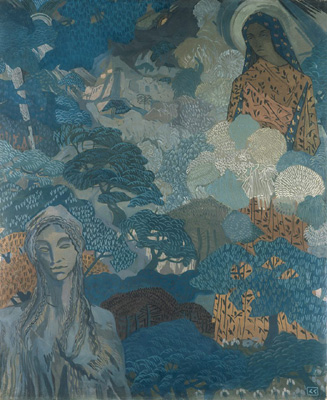"A new issue of the Zlatorog magazine is being prepared. We should as Sirak about that. The Slovo newspaper is out – let’s call Sirak and hear what he’s got to say. An exhibition will be opened or an art committee will be established – let’s ask Siraka…” this is how an article by Anna Kamenova published in the Zlatorog magazine in 1943 on the occasion of the death of artist SirakSkitnik starts. “Let’s us ask Sirak” is the title of a discussion that attracts visitors’ attention to Square 500 national gallery. Art historian Boryana Valchanova told us more about it:
 "Let us ask Siraka" is one of the series of lectures, devoted to various artists under an initiative of the National Gallery. Once a month one of the curators of the National Gallery presents a problem, artist or painting, that is among the art works in the exhibition of "Square 500". The first lecture was dedicated to the work of Vassil Stoilov, the second was dedicated to Jules Pascin. The gallery holds one of the largest collections of works by Sirak Skitnik- over 177 originals. The exhibition sheds light to all of his periods – from his earliest works from St. Petersburg up to his death in 1943. There are 7 works by Sirak Skitnik in the permanent exhibition.”
"Let us ask Siraka" is one of the series of lectures, devoted to various artists under an initiative of the National Gallery. Once a month one of the curators of the National Gallery presents a problem, artist or painting, that is among the art works in the exhibition of "Square 500". The first lecture was dedicated to the work of Vassil Stoilov, the second was dedicated to Jules Pascin. The gallery holds one of the largest collections of works by Sirak Skitnik- over 177 originals. The exhibition sheds light to all of his periods – from his earliest works from St. Petersburg up to his death in 1943. There are 7 works by Sirak Skitnik in the permanent exhibition.”
Artist, poet, critic, director and art secretary of the National Theatre, he was also the first director of the Bulgarian National Radio. He was the first president of the Union of Bulgarian Artists. His real name was Panayot Todorov Hristov - better known as SirakSkitnik (Orphan Wanderer). He was characterised by and unusual combination of different talents with innovative contributions and irresistible impact on Bulgarian culture from the first half of the 20th century. Thismakes him a bright figure in the cultural life of this country. Born in Sliven in 1883, he became orphan as a child. He studied in the seminary, and then moved to St. Petersburg, where he graduated in fine arts. On his return to Sofia he debuted as a poet – with a collection, entitled "Confession." He participated in three wars - the Balkan Wars and the First World War. It's hard to tell everything about Sirak Skitnik in brief and that is why we asked Boyana Valchanova on how to recognize his art among that of other Bulgarian artists.
"In his art he really has many faces and to this day he causes a huge interest among researchers and critics. He is representative of various styles- native art, art nouveau, expressionism. I think what is important to say about him is that in addition to being an artist, he was a poet, art critic, and the first director of the Bulgarian National Radio. He was a truly cosmopolitan person who left his mark in Bulgaria’s cultural and social life. It is difficult to think of another artist who has such big influence in a number of spheres. As an art director of the National Theatre he contributed greatly to improving the working environment and scenography as art. Over the years he created illustrations to poems by Edgar Allan Poe, to "Bulgarian Ballads" by Theodore Trayanov and this way greatly contributed to the development of the art of illustration in Bulgaria at the time.”
Despite his enduring presence in the cultural life of Bulgaria in the early 20th century, several decades after his death, his paintings in public galleries and private collections rarely are rarely seen. His literary creativity, criticism and theatrical work, remain poorly studies. The explanation for the sad fate of his heritage, is the fact the communist regime declared him reactionist and banned his paintings and his poetry. Today his art reminds us that "There is eternal reviving art, ever new and ever old – just like the human soul.”
English version: Alexander Markov
Photos: nationalartgallerybg.org
Nearly 30,000 people applauded Andrea Bocelli as he celebrated the 30th anniversary of his career in Sofia on Saturday night, September 14. The audience braved the rainy weather to attend the Italian tenor's two-hour performance at the Vasil..
On the evening of September 13, the National Opera and Ballet of North Macedonia presented "Nabucco" at the Sofia Opera and Ballet . The production is by an Italian team. The director is Renato Bonajuto and conductor is Bisera..
The festival of Bulgarian cinema, which takes place from September 10 to 13 in Paris, will continue in Sofia. The French Cultural Institute in the Bulgarian capital will present to the Francophone audience in this country films from..
Triumph , the film by the directorial tandem Kristina Grozeva and Petar Valchanov, won the grand prix for feature film at the 42 nd Golden Rose..
The second edition of Street Music Fest, a festival of street music and authentic urban culture, is taking place in the capital's Slaveykov Square from..
After 17 successful performances in Europe, the popular literary format ''Fairy Tales Post Box'' continues its European tour with 11 more locations. It..

+359 2 9336 661
